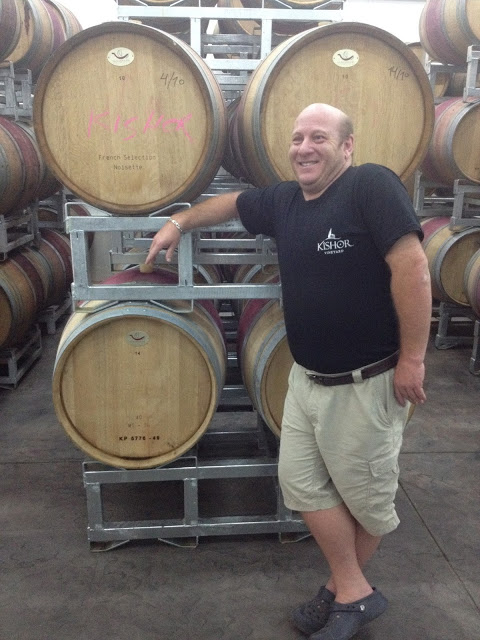FILTER
IMPACT BLOG
Email: customerservice@jnf.org
Feb 2, 2016 By Noah Alhadeff Category: Special Needs,
An inclusive society is a better society: How Israel weaves the disabled into its fabric

Photo: Miriam Braun
Evan Samuels, one of the special-needs workers at Kishor Winery.
Throughout February, to mark Jewish Disability Awareness Month, we'll be featuring stories about special needs and inclusion in Israel. Look for them on this blog, as well as on JNF's main Facebook page, its Humans of JNF Facebook page, and Instagram.
Evan Samuels, one of the special-needs workers at Kishor Winery.
Throughout February, to mark Jewish Disability Awareness Month, we'll be featuring stories about special needs and inclusion in Israel. Look for them on this blog, as well as on JNF's main Facebook page, its Humans of JNF Facebook page, and Instagram.
From Eilat to the Golan Heights, there are dozens of wineries in Israel. Each one operates pretty much the same as the next: Seeds are planted, grapes are grown, grapes get mashed, juice gets aged, and wine gets bottled. But at Kishor Winery in Israel's north, something, well, special is happening.
Along the wine-making timeline you’ll see adults with special needs pitching in to do things like prune the grapevines and work in the bottling warehouse. Their disabilities range from the behavioral to the physical and mental, but one thing remains constant. They're being included just like everyone else.
Along the wine-making timeline you’ll see adults with special needs pitching in to do things like prune the grapevines and work in the bottling warehouse. Their disabilities range from the behavioral to the physical and mental, but one thing remains constant. They're being included just like everyone else.
In a country where nearly one in five adults has some form of disability, according to the Myers-JDC Brookdale Institute, it's not hard to find organizations that make true disability inclusion their imperative. Kibbutz Kishorit, where the Kishor Winery is located, is just one of them. "Each member contributes to the community according to his ability and takes from the community according to his need," the kibbutz says.
According to a 2013 UNICEF report, an inclusive education for children with disabilities broadens the horizons of all children, and disability inclusion helps tackle the discrimination that pushes them further into the margins of society. That notion -- that it's not only those with disabilities who benefit from inclusivity, but society as a whole -- is echoed by General Iftach Ron-Tal, the new president of Special in Uniform, which integrates young people with disabilities into the Israel Defense Forces.
 |
| Photo: Tzippy Avni After completing a prep course through Special in Uniform, Shir now serves proudly in Israel's navy. |
"Building a society that looks beyond a person's disability is a win-win situation," he told the JNF blog recently. "It's a key measure of the civilization we hope to build together, and if there is one thing the Jewish people have to offer humanity, it's the notion that we are all created in the image of God."
It's a philosophy I observed in action many times this summer as I visited JNF partners that focus in unusual ways on enriching the lives of those with special needs. Places like LOTEM-Making Nature Accessible, which offers educational outdoor activities, like a wheelchair-accessible winepress, for children and adults with special needs. And Aleh Negev, which provides high-level medical and rehabilitative aid to severely disabled adults and children in need of complex care. Aleh Negev has a therapeutic petting zoo, therapeutic horseback riding, and a sensory garden full of aromatic plants that residents can touch.
Not far from Kibbutz Kishorit, in Kfar Vradim, is Ma'arag, an arts center where special-needs artists from the community serve as a focal point. The on-campus cafe offers Galilean delicacies and the gallery displays woodwork, ceramics, sewing and cooking gifts made by Ma'arag's special-needs artists.
At Ma'arag, extra care is taken to ensure every step in the manufacturing process of all artwork can be tackled by everyone, regardless of disability. For example, to create a uniform look for ceramics, cookie cutters are used for the clay while the sturdy handmade lounge chairs found throughout the campus require only two screws to hold them together. This way, no matter what the functioning level of the artist, everyone can make an identical product. They create on an equal playing field.
 |
Photo: Miriam Braun At Ma'arag arts center, care is taken to make sure all creations have a uniform look. |
In addition to building up the residents' sense of self-worth and identity, the organization provides tangible value to the community and Israel at large through its multimedia program. Ma'arag residents work at computers reviewing thousands of documents, lectures and VHS tapes from local universities and convert them to digital formats through a painstaking process that requires a level of exquisite concentration common to those on the autism spectrum.
For those still having trouble conceptualizing life with a disability, Ma’arag offers tours and ceramics workshops to simulate the creative process of a special-needs artist and give participants new insights into what's it like to have special needs.
In 1998, Israel enacted the broad-reaching Equal Rights for Persons with Disabilities Law "to protect the dignity and liberty of a person with disabilities and anchor his right to equal and active participation in society in all walks of life, as well as provide a suitable response to his special needs in such a manner as to enable him to live his life with maximum independence, in privacy and with dignity, by exploiting his fullest potential."
The word dignity came to mind many times as I visited some of the Israeli organizations striving to aid and include the disabled. It's heartening to see the country putting disability inclusion into action -- and strengthening all of Israeli society along the way.
| Photo: Robert Kerzner At residential rehabilitation village Aleh Negev, compassion is everywhere you look. |
